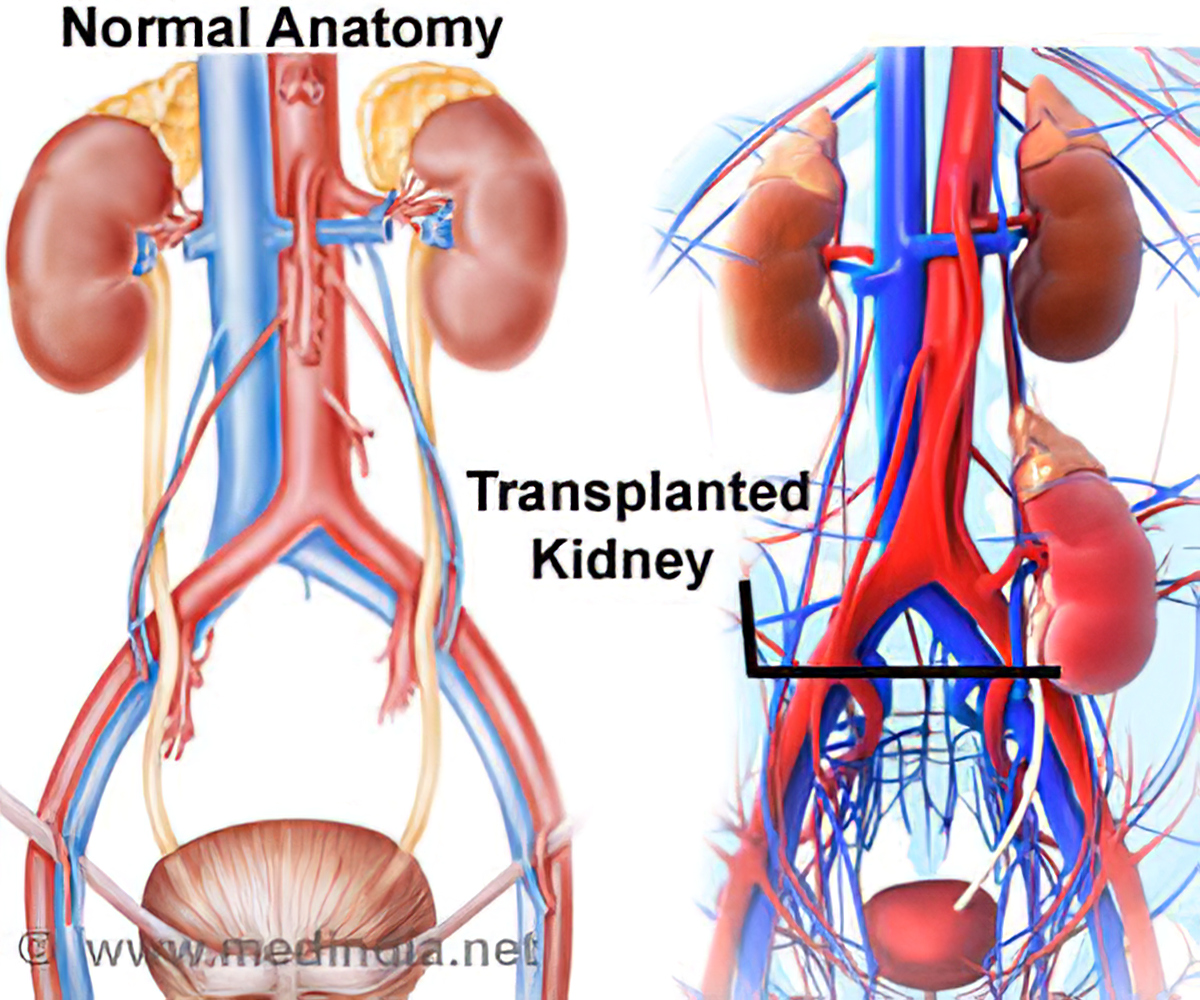KATHMANDU: A transplanted kidney’s lifespan is 15 to 20 years on average.
If the kidney stops working, the patient is back on the waiting list for a new one. However, a second or even a third transplant is more complex, as finding a new good match between donor and recipient becomes increasingly difficult.
In practice, this often results in patients having to undergo dialysis treatment for a long time, or even for the rest of their lives. To avoid this, extending the lifespan of transplant kidneys should be prioritized.
According to Statistics, every year Nepal sees around 3000 patients with cases of kidney failure. Around 400 patients are waiting for their turns for a kidney transplant and more than this number is waiting to avail of dialysis service. Nepal has a total of 201 dialyzers in 21 hospitals across the country. Around 1930 patients are using them for dialysis every year.
The cost of kidney transplants is unbelievably high. Tribhuvan University Teaching Hospital charges around NPR 400,000 to 500,000 for the transplant, while the Human Organ Transplant Centre charges NPR 300,000. The HLA test is done before the operation alone costs about NPR 100,000.

In Nepal, the Tribhuvan University Teaching Hospital successfully conducted a kidney transplant in 2018. It made history by successfully transplanting kidneys of three patients between August 8 and 14.
Hem Raj Shrestha, 37, of Buddhanilkantha became the first to get his kidney transplanted on August 8, 2018. His wife had donated her kidney. The second transplant was of a lady. On August 10, Satya Laxmi Shrestha of Sankhu underwent a kidney transplant. The kidney was donated by her husband Krishna Bahadur Shrestha. Similarly, the kidney transplant of 23-year-old Gomali Thapa was conducted on August 13.
Gomali’s mother Bimala Thapa, who was diagnosed with kidney failure a year ago, said her daughter would not have got a new lease of life had TUTH not operated on her.
What is a kidney transplant?
A kidney transplant is a surgical procedure that’s done to treat kidney failure. The kidneys filter waste from the blood and remove it from the body through your urine. They also help maintain your body’s fluid and electrolyte balance. If your kidneys stop working, waste builds up in your body and can make you very sick.
People whose kidneys have failed usually undergo a treatment called dialysis. This treatment mechanically filters waste that builds up in the bloodstream when the kidneys stop working.
Some people whose kidneys have failed may qualify for a kidney transplant. In this procedure, one or both kidneys are replaced with donor kidneys from a live or deceased person.
There are pros and cons to both dialysis and kidney transplants.
Undergoing dialysis takes time and is labor-intensive. Dialysis often requires making frequent trips to a dialysis center to receive treatment. At the dialysis center, your blood is cleansed using a dialysis machine.
If you’re a candidate to have dialysis in your home, you’ll need to purchase dialysis supplies and learn how to use them.
A kidney transplant can free you from long-term dependence on a dialysis machine and the strict schedule that goes with it. This can allow you to live a more active life. However, kidney transplants aren’t suitable for everyone. This includes people with active infections and those who are severely overweight.
During a kidney transplant, your surgeon will take a donated kidney and place it in your body. Even though you’re born with two kidneys, you can lead a healthy life with only one functioning kidney. After the transplant, you’ll have to take immune-suppressing medications to keep your immune system from attacking the new organ.
Who might need a kidney transplant?
A kidney transplant may be an option if your kidneys have stopped working entirely. This condition is called end-stage renal disease (ESRD) or end-stage kidney disease (ESKD). If you reach this point, your doctor is likely to recommend dialysis.
In addition to putting you on dialysis, your doctor will tell you if they think you’re a good candidate for a kidney transplant.
You’ll need to be healthy enough to have major surgery and tolerate a strict, lifelong medication regimen after surgery to be a good candidate for a transplant. You must also be willing and able to follow all instructions from your doctor and take your medications regularly.
If you have a serious underlying medical condition, a kidney transplant might be dangerous or unlikely to be successful. These serious conditions include:
- cancer, or a recent history of cancer
- serious infection, such as tuberculosis, bone infections, or hepatitis
- severe cardiovascular disease
- liver disease
This evaluation usually involves several visits to assess your physical, psychological, and familial conditions. The center’s doctors will run tests on your blood and urine. They’ll also give you a complete physical exam to ensure you’re healthy enough for surgery.
A psychologist and a social worker will also meet with you to make sure you’re able to understand and follow a complicated treatment regimen. The social worker will make sure you can afford the procedure and that you have adequate support after you’re released from the hospital.
If you’re approved for a transplant, either a family member can donate a kidney or you’ll be placed on a waiting list with the Organ Procurement and Transplantation Network (OPTN). The typical wait for a deceased donor organ is over five years.
Who donates the kidney?
Kidney donors may be either living or deceased.
Living donors
Because the body can function perfectly well with just one healthy kidney, a family member with two healthy kidneys may choose to donate one of them to you.
If your family member’s blood and tissues match your blood and tissues, you can schedule a planned donation.
Receiving a kidney from a family member is a good option. It reduces the risk that your body will reject the kidney, and it enables you to bypass the multiyear waiting list for a deceased donor.
Deceased donors
Deceased donors are also called cadaver donors. These are people who have died, usually as the result of an accident rather than a disease. Either the donor or their family has chosen to donate their organs and tissues.
Your body is more likely to reject a kidney from an unrelated donor. However, a cadaver organ is a good alternative if you don’t have a family member or friend who’s willing or able to donate a kidney.
The matching process
During your evaluation for a transplant, you’ll have blood tests to determine your blood type (A, B, AB, or O) and your human leukocyte antigen (HLA). HLA is a group of antigens located on the surface of your white blood cells. Antigens are responsible for your body’s immune response.
If your HLA type matches the donor’s HLA type, it’s more likely that your body won’t reject the kidney. Each person has six antigens, three from each biological parent. The more antigens you have that match those of the donor, the greater the chance of a successful transplant.
Once a potential donor is identified, you’ll need another test to make sure that your antibodies won’t attack the donor’s organ. This is done by mixing a small amount of your blood with the donor’s blood.
The transplant can’t be done if your blood forms antibodies in response to the donor’s blood.
If your blood shows no antibody reaction, you have what’s called a “negative crossmatch.” This means that the transplant can proceed.
How is a kidney transplant performed?
The doctor can schedule the transplant in advance if you’re receiving a kidney from a living donor.
However, if you’re waiting for a deceased donor who’s a close match for your tissue type, you’ll have to be available to rush to the hospital at a moment’s notice when a donor is identified. Many transplant hospitals give their people pagers or cell phones so that they can be reached quickly.
Once you arrive at the transplant center, you’ll need to give a sample of your blood for the antibody test. You’ll be cleared for surgery if the result is a negative crossmatch.
A kidney transplant is done under general anesthesia. This involves giving you a medication that puts you to sleep during the surgery. The anesthetic will be injected into your body through an intravenous (IV) line in your hand or arm.
Once you’re asleep, your doctor makes an incision in your abdomen and places the donor kidney inside. They then connect the arteries and veins from the kidney to your arteries and veins. This will cause blood to start flowing through the new kidney.
Your doctor will also attach the new kidney’s ureter to your bladder so that you’re able to urinate normally. The ureter is the tube that connects your kidney to your bladder.
Your doctor will leave your original kidneys in your body unless they’re causing problems, such as high blood pressure or infection.
Aftercare
You’ll wake up in a recovery room. Hospital staff will monitor your vital signs until they’re sure you’re awake and stable. Then, they’ll transfer you to a hospital room.
Even if you feel great after your transplant (many people do), you’ll likely need to stay in the hospital for up to a week after surgery.
Your new kidney may start to clear waste from the body immediately, or it may take up to a few weeks before it starts functioning. Kidneys donated by family members usually start working more quickly than those from unrelated or deceased donors.
You can expect a good deal of pain and soreness near the incision site while you’re first healing. While you’re in the hospital, your doctors will monitor you for complications. They’ll also put you on a strict schedule of immunosuppressant drugs to stop your body from rejecting the new kidney. You’ll need to take these drugs every day to prevent your body from rejecting the donor’s kidney.
Before you leave the hospital, your transplant team will give you specific instructions on how and when to take your medications. Make sure that you understand these instructions, and ask as many questions as needed. Your doctors will also create a checkup schedule for you to follow after surgery.
Once you’re discharged, you’ll need to keep regular appointments with your transplant team so that they can evaluate how well your new kidney is functioning.
You’ll need to take your immunosuppressant drugs as directed. Your doctor will also prescribe additional drugs to reduce the risk of infection. Finally, you’ll need to monitor yourself for warning signs that your body has rejected the kidney. These include pain, swelling, and flu-like symptoms.
You’ll need to follow up regularly with your doctor for the first one to two months after surgery. Your recovery may take about six months.
What are the risks of a kidney transplant?
A kidney transplant is major surgery. Therefore, it carries the risk of:
- an allergic reaction to general anesthesia
- bleeding
- blood clots
- leakage from the ureter
- a blockage of the ureter
- an infection
- rejection of the donated kidney
- failure of the donated kidney
- a heart attack
- a stroke
Potential risks - The most serious risk of a transplant is that your body rejects the kidney. However, it’s rare that your body will reject your donor’s kidney.
The Mayo Clinic estimates that 90 percent of transplant recipients who get their kidney from a living donor live for at least five years after surgery. About 82 percent of those who received a kidney from a deceased donor lives for five years afterward.
If you notice unusual soreness at the incision site or a change in the amount of your urine, let your transplant team know right away. If your body does reject the new kidney, you can resume dialysis and go back on the waiting list for another kidney after being evaluated again.
The immunosuppressant drugs you must take after surgery can lead to some unpleasant side effects as well. These may include:
- weight gain
- bone thinning
- increased hair growth
- acne
- a higher risk of developing certain skin cancers and non-Hodgkin’s lymphoma
(with inputs from Healthline and agencies)









Comment